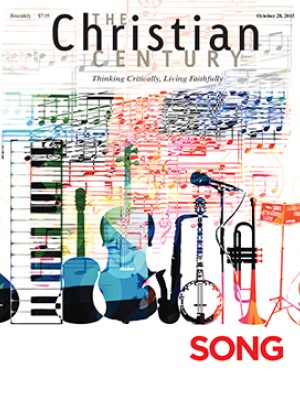Pope lays out political, ecclesial vision
The six days of Pope Francis’s first U.S. visit were packed with historic speeches and meetings, as well as various masses, parades, photo ops, and lectures—the latter mainly to his bishops.
Dialogue amid disagreement, finding joy through sacrifice—these were notes the pope sounded in his speeches in Washington, D.C., his first stop, where he met President Obama and addressed Congress, and also when he spoke to the United Nations in Manhattan.
The 78-year-old pontiff began his trip September 19 with a three-day stay in Cuba before moving on to the United States, stopping also in Philadelphia, where close to a million people jammed a thoroughfare for his closing mass on September 27.
In a personal talk that blended poetry and a new set of marching orders for the U.S. hierarchy, Pope Francis told 300 U.S. bishops gathered in Washington to engage in dialogue.
“Otherwise,” he said, “we fail to understand the thinking of others, or to realize deep down that the brother or sister we wish to reach and redeem, with the power and the closeness of love, counts more than their positions, distant as they may be from what we hold as true and certain.”
Read our latest issue or browse back issues.
He spoke of the “seamless garment” tradition, which treats Catholic teachings and the church’s witness as all of a piece rather than singling out one or two issues.
“Harsh and divisive language,” he said, “does not befit the tongue of a pastor. . . . Although it may momentarily seem to win the day, only the enduring allure of goodness and love remains truly convincing.”
In a similar vein, in his address to Congress he laid out a vision of political cooperation for the common good—one that highlighted economic injustice as a chief threat to family life, that stressed the moral imperative to care for the environment, that denounced profits “drenched in blood” from the arms industry, and that forcefully argued for America to welcome, not reject, immigrants.
“If politics must truly be at the service of the human person, it follows that it cannot be a slave to the economy and finance,” Francis said. “A good political leader is one who, with the interests of all in mind, seizes the moment in a spirit of openness and pragmatism.”
Though the House chamber was packed for the joint meeting, some legislators boycotted the speech. Rep. Paul Gosar, a Jesuit-educated Catholic from Arizona, said he was upset with the pope’s high-profile effort to combat global warming.
Despite such disagreement, the pope continued to focus on climate change at the United Nations on September 25, where he told world leaders that they must work to protect creation because “a true ‘right of the environment’ does exist”—a right he said was bound up with a moral duty to assure the basic needs of “the vast ranks of the excluded.”
The global environment and the world’s powerless, he added, “are closely interconnected and made increasingly fragile by dominant political and economic relationships.”
At Madison Square Garden, he spoke about those who are lost amid the din of the great city, about “all those people who don’t appear to belong, or are second-class citizens,” about those abandoned “in deafening anonymity.”
The hope of faith, however, is “a hope which liberates us from the forces pushing us to isolation and lack of concern for the lives of others, for the life of our city. A hope which frees us from empty ‘connections,’ from abstract analyses, or sensationalist routines. A hope which is unafraid of involvement, which acts as a leaven wherever we happen to live and work. A hope which makes us see, even in the midst of smog, the presence of God as he continues to walk the streets of our city.”
Francis also met privately at a seminary in Philadelphia with five adults who had been sexually abused as children by priests, teachers, or relatives, and in an address to bishops at a major church meeting on families in Philadelphia, he vowed to hold accountable bishops who allow priests to abuse children. However, a leading victims’ advocacy group in the U.S. dismissed the meeting as another “feel good, do nothing” papal meeting with survivors.
While in Philadelphia Francis made an unannounced stop, joined by his friend Abraham Skorka, a rabbi from Buenos Aires, reported the Forward, a Jewish publication. On the campus of St. Joseph’s University the pope blessed with holy water a sculpture that was commissioned by the Institute for Jewish-Catholic Relations. The sculpture “repudiates a centuries-old anti-Semitic image,” the Forward wrote, in which “the Christian ‘Ecclesia’ stands proudly, wearing a crown, while the defeated ‘Synagoga’ is blindfolded by a serpent, her staff broken, her tablets slipping from her hand.” In contrast, the sculpture that Francis blessed shows the two figures seated side-by-side, seemingly studying together.
These gestures by Pope Francis are “a sign of his commitment to the Jewish people,” Skorka said. “Our friendship is a paradigm of what has to be the great relationship between Jews and Christians.” —Religion News Service; added sources
This article was edited on October 13, 2015.






